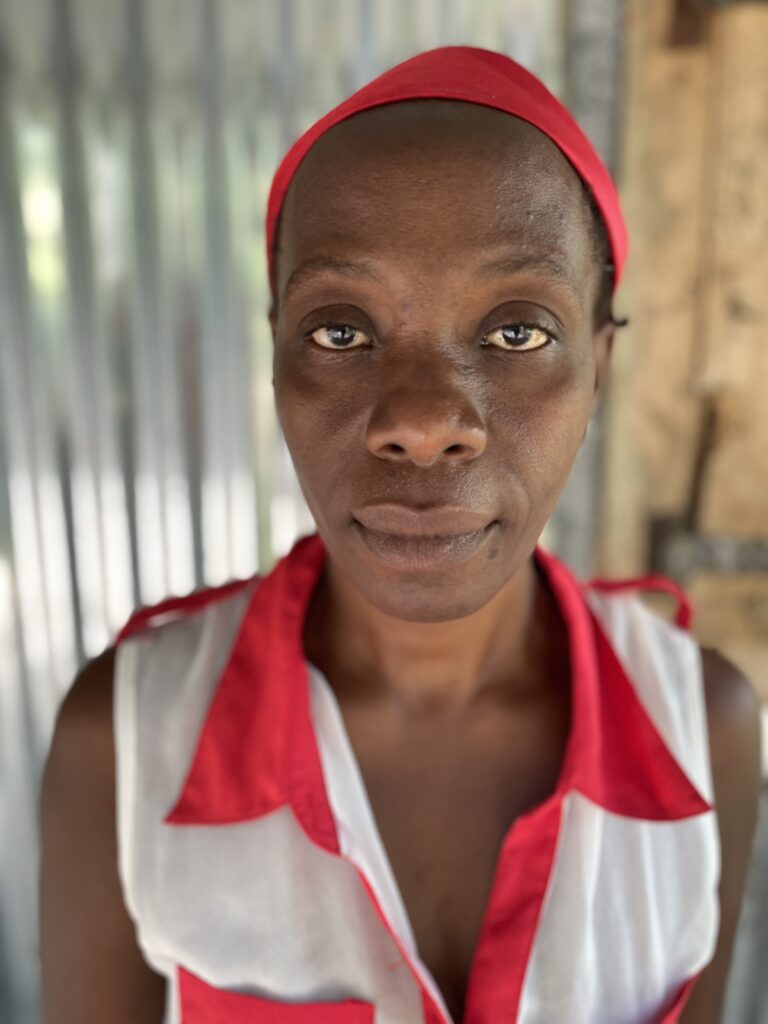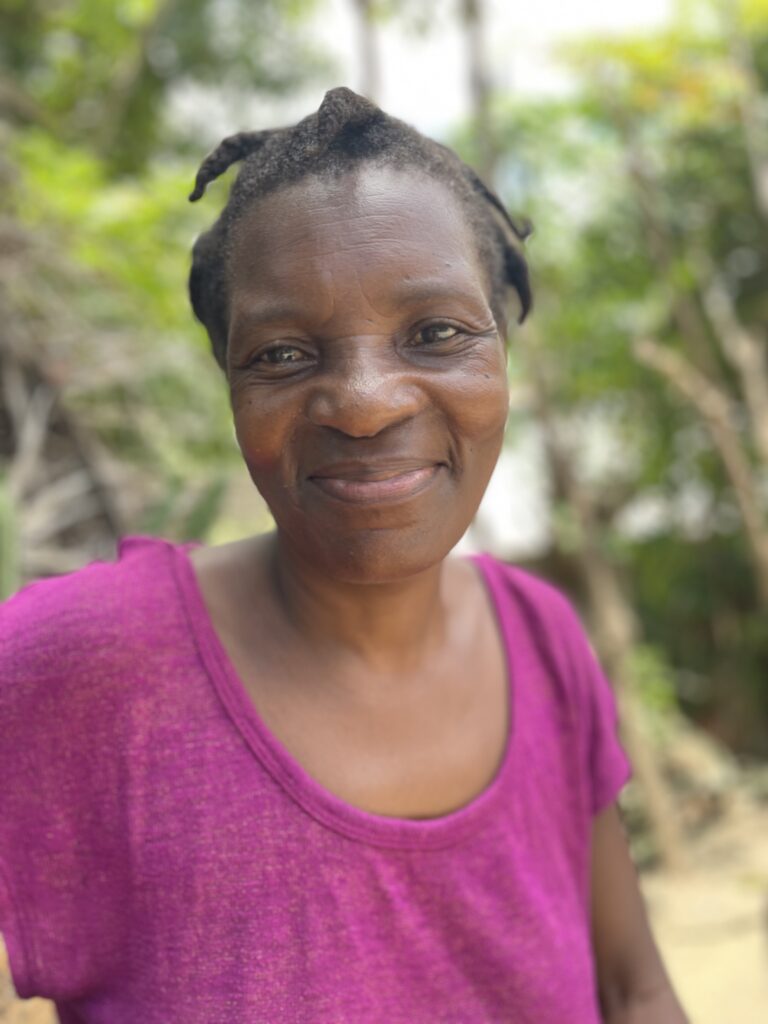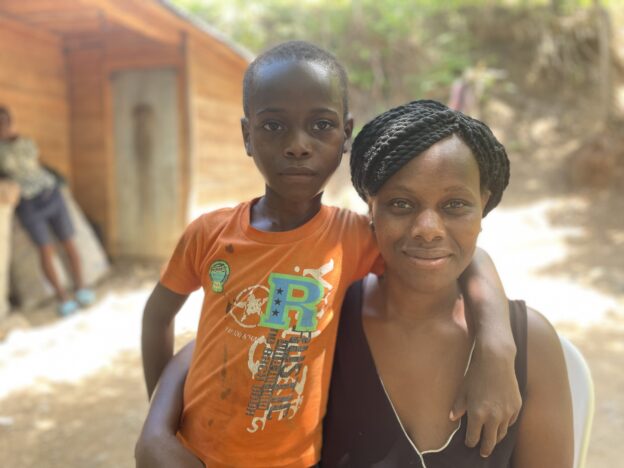The CLM program is just getting started for Rositha, a 31-year-old single mother of six from the hill above Kalabat in the Rivyè Mansèl section eastern Gwomòn. The father of her first three children abandoned them and her, but then she found another man and had three more kids with him.
He helped her take care of the kids she already had, and the couple was struggling along. The man farmed, and she had a small business selling corn in downtown Gwomòn. Sometimes she’d buy plantains near her home and hike downtown with them, carrying them on her head, for sale there. She and her children lived then, as they live now, in one room of a home that belongs to her brother. Other family members live in the home’s other two rooms. Her partner lived nearby, with his parents.
But the man grew sick. She spent all the capital in her business trying to help him back to health, but he eventually passed away. She was left on her own with her kids. Family members took the two oldest to lighten her burden. They are now in school, but they aren’t with her. She’s been struggling along with the other four, living mainly on charity from family members.
When the CLM staff started working in her neighborhood, she did not think much of it. When they visited her a couple of times, asking questions, she was happy to respond. She didn’t know what it was about, but she says, “I thought I might make something out of it.”
She enjoyed the six days of training that launched her into the program, and she looks forward to the chance to apply what she learned. She hopes to be able to use the investment that the program will make in her livelihood both to return to small commerce and to begin raising goats. She thinks that commerce is important because it can give you the money you need to manage your family and also allow you to save something. And she wants to raise goats because they give you something you can sell if you run into a sudden need.
She does not yet have a real vision of what she wants to accomplish in the 18 months she will spend in the program. For now, she says only that she hopes when she graduates to be able to hold onto what she has come to possess.

Germène lives in her mother’s house with three of her kids. One daughter spend the school year in downtown Gwomòn with family that sends her to school, but she comes home for vacation. The children’s father is not around. “He’s not here because life is hard. He goes around looking for work. He is in Okap now. The children like to talk with him on the phone when they can.”
She is supported, as is a younger sister who is also now a CLM member, by their mother and stepfather. Their stepfather farms. She too has land she could farm, but she doesn’t have the resources she’d need to plant.
She didn’t see anything odd about the questions the CLM asked her during their selection visits. “I didn’t know why they were asking all those questions. Now I know.”
She’s been frustrated by her struggle. “You get up in the morning, but you don’t do anything. you have children you don’t send to school. It’s like you’re no good to them.” She hopes that CLM will give her a way to acquire things that she has not been able to have.
Like Rositha, she’s is interested in small commerce and goats, and for some of the same reasons. Goats are easy to care for, and they give you a way to get your hands on money if you have a problem you need to solve. Small commerce gives you a regular income. You can take care of your family and deposit money in a savings club.
During her six days of training, she received a daily stipend. All the new members did. This small stipend, worth less than $2 per day, was originally conceived to cover transportation costs, but over the years members have almost always decided to walk to training so that they can use the stipend in other ways. Germène used hers to begin making contributions to a savings club. The members of the club take turns receiving the whole pot after each regular contribution. Germene’s turn hasn’t come yet, and she initially hoped to be able to use her turn to set herself up in a small business, but the one child she sent to school this year was sent home for non-payment of fees. So, she now thinks that the money will have to go to the school.

Edouarin and her husband Vercius have a large family. One of their younger daughters helps Edouarin count how many live together in their home. They have eleven children, though just six still live with them. The two oldest now live in their own homes. Another three, Vercius says, are “out in search of a living.” They have five grandchildren with them as well. So, they are 13 all together.
Edouarin says that the house they live in belongs to her brother-in-law. Their own house was in a miserable state, and the brother-in-law was living in Gonayiv, the large city to the south of Gwomòn, so he said that they could just use his.
The couple survives by Vercius’s farming. Some of the land is theirs, but mostly he works as a sharecropper, giving up half the yield to the land owner in exchange for the right to work it.
Edouarin wants to start raising livestock with the program. She’s hoping to have both goats and pigs. They offer what she calls a “garanti.” She explains that the garanti is the young that the animals will have. For her, it is a profit she can count on.
But she also wants to get into small commerce, and she explains that she wants to contribute money to the household. She does not want to count on her husband’s farming for everything. “If he pays for the rice, I can buy the oil and the salt.” And she adds, “I’ll will feel differently about myself when I have my own [economic] activity.”
She doesn’t yet have much in the way of specific goals for CLM, but she know what is important to her. “I do not ever want the children to have to sit at home again. I want them to always be able to go to school.”
